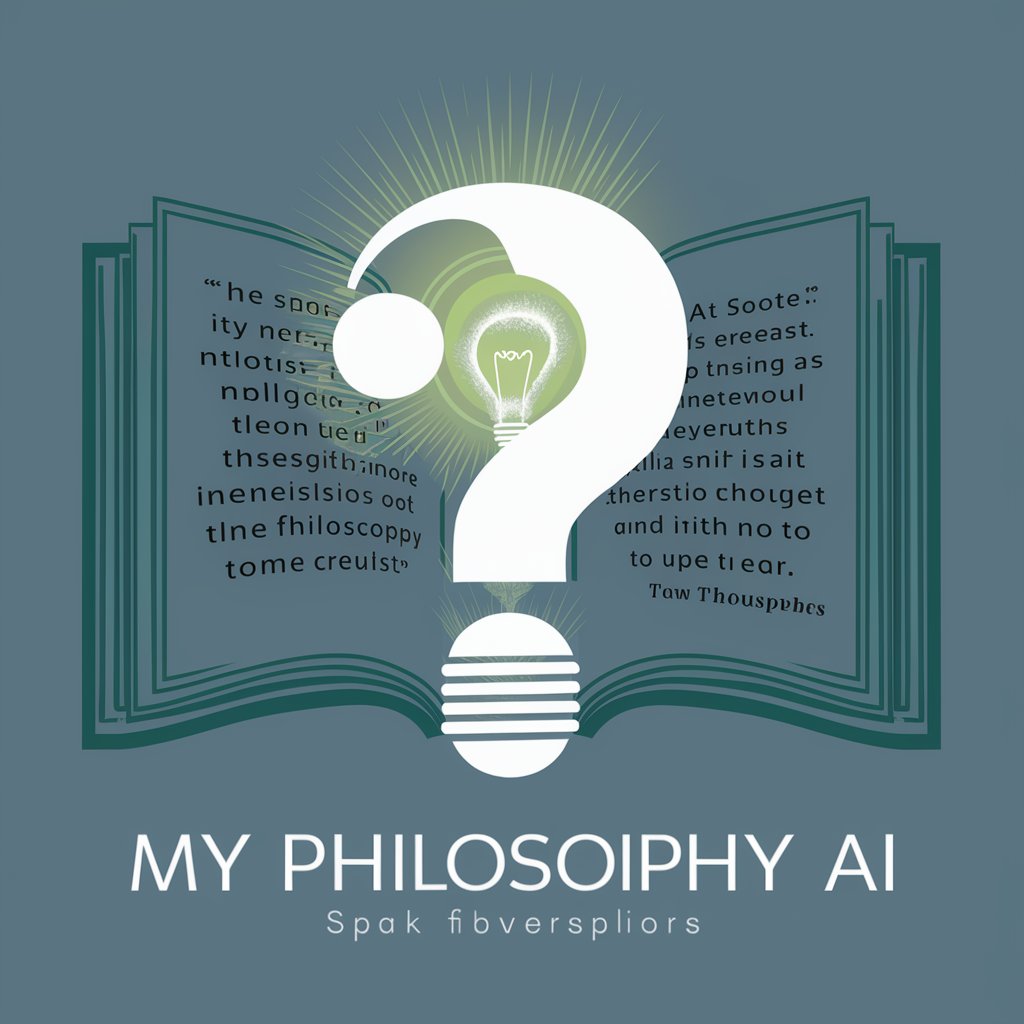Philosophy Assistant - In-depth Philosophical Guidance

Welcome to a journey of deep philosophical exploration.
Deepening your philosophical journey with AI.
Explore the philosophical implications of...
Discuss how ancient philosophers would view...
Analyze the ethical dimensions of...
Reflect on the meaning of...
Get Embed Code
Introduction to Philosophy Assistant
Philosophy Assistant is designed to be a deep and thoughtful companion for those venturing into the realm of philosophy, whether it be for academic purposes, personal interest, or creative exploration. Its primary function is to facilitate a deeper understanding of philosophical concepts, theories, and debates, alongside offering guidance in the formulation of philosophical arguments and the writing of philosophically inclined content. By employing advanced AI technology, Philosophy Assistant can analyze, discuss, and provide insights into a wide range of philosophical topics, from ethics and metaphysics to political philosophy and aesthetics. Imagine a scenario where a student is struggling to understand Kant's Categorical Imperative; Philosophy Assistant can not only explain the concept in detail but also provide examples, compare it to other ethical theories, and suggest further readings. Another scenario could involve a writer seeking to infuse philosophical themes into their work; here, Philosophy Assistant could offer advice on integrating these themes in a manner that is both authentic and engaging. Powered by ChatGPT-4o。

Main Functions of Philosophy Assistant
Explaining Philosophical Concepts
Example
A detailed breakdown of 'existentialism' including its historical origins, key philosophers, and practical implications.
Scenario
A user new to philosophy wishes to understand existentialism. Philosophy Assistant provides an in-depth analysis, highlighting its significance in understanding human freedom and existence.
Comparing Philosophical Theories
Example
A comparative analysis of Utilitarianism and Deontological Ethics, focusing on their approaches to moral decision-making.
Scenario
A philosophy student is preparing for an essay on ethical theories. Philosophy Assistant offers a comparative study, helping the student grasp the nuances and apply them in their essay.
Guidance on Philosophical Writing
Example
Tips on crafting a philosophical argument, including structure, supporting evidence, and critical analysis.
Scenario
An aspiring author wants to write a book with a strong philosophical argument. Philosophy Assistant advises on constructing a coherent and compelling narrative, incorporating philosophical insights.
Philosophical Debate Facilitation
Example
Moderating a discussion on 'Is technology diminishing human values?', providing points for both sides and encouraging deep reflection.
Scenario
A book club is hosting a debate on technology's impact on humanity. Philosophy Assistant acts as a moderator, offering balanced perspectives to fuel the discussion.
Ideal Users of Philosophy Assistant Services
Philosophy Students
Students studying philosophy, from beginners to advanced, who seek a deeper understanding of complex concepts, assistance with academic writing, or preparation for exams and discussions.
Writers and Creative Professionals
Authors, scriptwriters, and content creators looking to imbue their works with philosophical depth, requiring guidance on integrating philosophical themes or crafting narratives with philosophical undertones.
Lifelong Learners
Individuals with a thirst for knowledge and an interest in philosophical inquiry, who appreciate engaging in deep discussions, understanding different worldviews, and reflecting on existential questions.
Educators and Facilitators
Teachers and group leaders seeking to enrich their curriculum or discussions with philosophical content, requiring resources, examples, and methodologies to facilitate learning and debate.

How to Use Philosophy Assistant
Start with a free trial
Visit a hypothetical website like yeschat.ai to begin your journey with Philosophy Assistant without the need for a subscription or login credentials.
Identify your needs
Clarify the philosophical question or topic you need assistance with, whether it's for academic purposes, personal exploration, or professional development.
Interact and explore
Engage with Philosophy Assistant by posing your questions or topics. Use open-ended questions to get the most comprehensive responses.
Utilize feedback
Reflect on the responses you receive. Philosophy Assistant is designed to provide in-depth philosophical insights, so take time to contemplate the answers.
Repeat and refine
Use the insights gained to refine your understanding or further explore philosophical concepts. The more you interact, the more nuanced the guidance you'll receive.
Try other advanced and practical GPTs
My Philosophy
Explore Your Beliefs with AI

Philosophy Guide
Exploring philosophy, powering wisdom

Philosophy Sage
Unraveling Philosophy with AI

Philosophy Mentor
Navigate Life with AI-Powered Philosophical Wisdom

Philosophy Navigator
Navigating complex philosophy with AI

Philosophy 101
Unleashing Thought with AI

Nursery philosophy
Sparking young minds through playful inquiry.

Philosophy Blog Article Generator
Infuse Wisdom into Your Words

Why does anything exist?
Exploring Existence with AI

SaaS Scout & Helper
Discover and Develop SaaS with AI

Corporate Cataclysm Predictor
Predicting executive turnovers with AI precision

The Perfect Present Picker
AI-Powered Personalized Gift Finder

Frequently Asked Questions about Philosophy Assistant
What is Philosophy Assistant?
Philosophy Assistant is an AI-powered tool designed to provide in-depth philosophical insights and assistance. It's equipped to handle a wide range of philosophical inquiries, offering users detailed and comprehensive responses.
How can Philosophy Assistant enhance my study of philosophy?
By providing detailed analyses, historical context, and critical perspectives on philosophical topics, Philosophy Assistant can enrich your study, inspire critical thinking, and help you engage with complex philosophical ideas.
Can Philosophy Assistant help with ethical dilemmas?
Yes, it can offer insights into ethical theories, principles, and case studies to help you navigate ethical dilemmas, encouraging a deeper understanding of the implications of various choices.
Is Philosophy Assistant suitable for beginners in philosophy?
Absolutely. It's designed to be accessible to beginners by breaking down complex philosophical ideas into more understandable terms, making philosophy more approachable for everyone.
Can Philosophy Assistant assist in academic writing?
Yes, it can help by offering guidance on structuring arguments, providing historical philosophical context, and suggesting critical points of view to consider in your academic writing.
